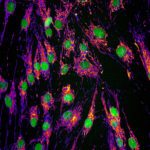Lien vers Pubmed [PMID] – 34512665
Lien DOI – 10.3389/fimmu.2021.729763
Front Immunol 2021 ; 12(): 729763
The immune response to viral infection involves the recognition of pathogen-derived nucleic acids by intracellular sensors, leading to type I interferon (IFN), and downstream IFN-stimulated gene, induction. Ineffective discrimination of self from non-self nucleic acid can lead to autoinflammation, a phenomenon implicated in an increasing number of disease states, and well highlighted by the group of rare genetic disorders referred to as the type I interferonopathies. To understand the pathogenesis of these monogenic disorders, and polyfactorial diseases associated with pathogenic IFN upregulation, such as systemic lupus erythematosus and dermatomyositis, it is important to define the self-derived nucleic acid species responsible for such abnormal IFN induction. Recently, attention has focused on mitochondria as a novel source of immunogenic self nucleic acid. Best appreciated for their function in oxidative phosphorylation, metabolism and apoptosis, mitochondria are double membrane-bound organelles that represent vestigial bacteria in the cytosol of eukaryotic cells, containing their own DNA and RNA enclosed within the inner mitochondrial membrane. There is increasing recognition that a loss of mitochondrial integrity and compartmentalization can allow the release of mitochondrial nucleic acid into the cytosol, leading to IFN induction. Here, we provide recent insights into the potential of mitochondrial-derived DNA and RNA to drive IFN production in Mendelian disease. Specifically, we summarize current understanding of how nucleic acids are detected as foreign when released into the cytosol, and then consider the findings implicating mitochondrial nucleic acid in type I interferonopathy disease states. Finally, we discuss the potential for IFN-driven pathology in primary mitochondrial disorders.

